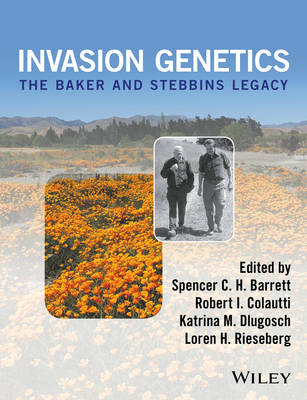
Invasion Genetics
Wiley-Blackwell (Verlag)
978-1-118-92216-3 (ISBN)
- Titel z.Zt. nicht lieferbar
- Versandkostenfrei
- Auch auf Rechnung
- Artikel merken
Invasion Genetics: the Baker & Stebbins legacy provides a state-of-the-art treatment of the evolutionary biology of invasive species, whilst also revisiting the historical legacy of one of the most important books in evolutionary biology: The Genetics of Colonizing Species, published in 1965 and edited by Herbert Baker and G. Ledyard Stebbins. This volume covers a range of topics concerned with the evolutionary biology of invasion including: phylogeography and the reconstruction of invasion history; demographic genetics; the role of stochastic forces in the invasion process; the contemporary evolution of local adaptation; the significance of epigenetics and transgenerational plasticity for invasive species; the genomic consequences of colonization; the search for invasion genes; and the comparative biology of invasive species. A wide diversity of invasive organisms are discussed including plants, animals, fungi and microbes.
Professor Loren H. Rieseberg, FRS, is a Canada Research Chair in Plant Evolutionary Genomics at the University of British Columbia. He is the Chief Editor of Molecular Ecology and a Fellow of the Royal Societies of Canada and London. He has pioneered the application of genomic approaches to the study of invasive plants, with a focus on the sunflower family. Professor Spencer C.H. Barrett, FRS, is University Professor and Canada Research Chair in Evolutionary Genetics in the Department of Ecology & Evolutionary Biology at the University of Toronto. Throughout his career he has worked on the ecology and evolution of invasive plant species, particularly their reproductive biology and genetics. He is a Fellow of the Royal Societies of London and Canada. Dr. Robert I. Colautti is the 2012 Banting Postdoctoral Fellow in the Botany Department at the University of British Columbia. He has been publishing important papers on the ecology and evolution of colonizing plants and animals for over a decade. Dr. Katrina M. Dlugosch is an Assistant Professor of Ecology and Evolutionary Biology at the University of Arizona. Her research career has focused on the evolutionary ecology of colonization, particularly the influence of genetic variation on the adaptive evolution of invading plants. A first edition of Baker & Stebbins is one of her most prized possessions.
Contributors, x Preface, xiii
1 Foundations of invasion genetics: the Baker and Stebbins legacy, 1
SPENCER C. H. BARRETT
PART 1 EVOLUTIONARY ECOLOGY, 19
Introduction, 21
KATRINA M. DLUGOSCH AND INGRID M. PARKER
2 The influence of numbers on invasion success, 25
TIM M. BLACKBURN, JULIE L. LOCKWOOD, AND PHILLIP CASSEY
3 Characteristics of successful alien plants, 40
MARK VAN KLEUNEN, WAYNE DAWSON, AND NOËLIE MAUREL
4 Evolution of the mating system in colonizing plants, 57
JOHN R. PANNELL
5 The population biology of fungal invasions, 81
PIERRE GLADIEUX, ALICE FEURTEY, MICHAEL E. HOOD, ALODIE SNIRC, JOANNE CLAVEL, CYRIL DUTECH, MÉLANIE ROY, AND TATIANA GIRAUD
6 Contemporary evolution during invasion: evidence for differentiation, natural selection, and local adaptation, 101
ROBERT I. COLAUTTI AND JENNIFER A. LAU
7 Exotics exhibit more evolutionary history than natives: a comparison of the ecology and evolution of exotic and native anole lizards, 122
MATTHEW R. HELMUS, JOCELYN E. BEHM, WENDY A.M. JESSE, JASON J. KOLBE, JACINTHA ELLERS, AND JONATHAN B. LOSOS
8 Causes and consequences of failed adaptation to biological invasions: the role of ecological constraints, 139
JENNIFER A. LAU AND CASEY P. terHORST
Discussion, 153
PART 2 EVOLUTIONARY GENETICS, 159
Introduction, 161
ROBERT I. COLAUTTI AND CAROL EUNMI LEE
9 Evolution of phenotypic plasticity in colonizing species, 165
RUSSELL LANDE
10 Chromosome inversions, adaptive cassettes and the evolution of species’ ranges, 175
MARK KIRKPATRICK AND BRIAN BARRETT
11 The distribution of genetic variance across phenotypic space and the response to selection, 187
MARK W. BLOWS AND KATRINA McGUIGAN
12 Information entropy as a measure of genetic diversity and evolvability in colonization, 206
TROY DAY
13 Expansion load: recessive mutations and the role of standing genetic variation, 218
STEPHAN PEISCHL AND LAURENT EXCOFFIER
14 The devil is in the details: genetic variation in introduced populations and its contributions to invasion, 232
KATRINA M. DLUGOSCH, SAMANTHA R. ANDERSON, JOSEPH BRAASCH, F. ALICE CANG, AND HEATHER D. GILLETTE
Discussion, 253
PART 3 INVASION GENOMICS, 261
Introduction, 263
LOREN H. RIESEBERG AND KATHRYN A. HODGINS
15 Genetic reconstructions of invasion history, 267
MELANIA E. CRISTESCU
16 Comparative genomics in the Asteraceae reveals little evidence for parallel evolutionary change in invasive taxa, 283
KATHRYN A. HODGINS, DAN G. BOCK, MIN A. HAHN, SYLVIA M. HEREDIA, KATHRYN G. TURNER, AND LOREN H. RIESEBERG
17 The role of climate adaptation in colonization success in Arabidopsis thaliana, 300
JILL A. HAMILTON, MIKI OKADA, TONIA KORVES, AND JOHANNA SCHMITT
18 A genetic perspective on rapid evolution in cane toads (Rhinella marina), 313
LEE A. ROLLINS, MARK F. RICHARDSON, AND RICHARD SHINE
19 Epigenetics of colonizing species? A study of Japanese knotweed in Central Europe, 328
YUAN]YE ZHANG, MADALIN PAREPA, MARKUS FISCHER, AND OLIVER BOSSDORF
Discussion, 341
20 What we still don’t know about invasion genetics, 346
DAN G. BOCK, CELINE CASEYS, ROGER D. COUSENS, MIN A. HAHN, SYLVIA M. HEREDIA, SARIEL HÜBNER, KATHRYN G. TURNER, KENNETH D. WHITNEY, AND LOREN H. RIESEBERG
Index, 371
| Erscheinungsdatum | 20.09.2016 |
|---|---|
| Verlagsort | Hoboken |
| Sprache | englisch |
| Maße | 191 x 246 mm |
| Gewicht | 998 g |
| Themenwelt | Naturwissenschaften ► Biologie ► Evolution |
| Naturwissenschaften ► Biologie ► Genetik / Molekularbiologie | |
| ISBN-10 | 1-118-92216-6 / 1118922166 |
| ISBN-13 | 978-1-118-92216-3 / 9781118922163 |
| Zustand | Neuware |
| Haben Sie eine Frage zum Produkt? |
aus dem Bereich


